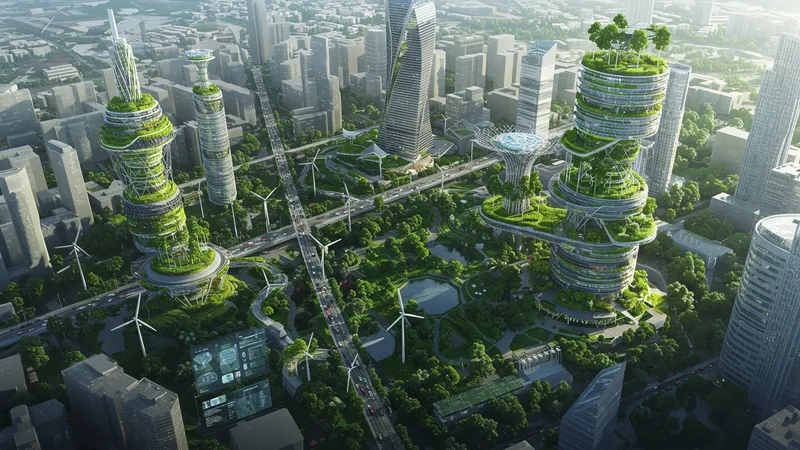

क्या आप जानते हैं कि कंप्यूटर विज्ञान के कुछ बेहतरीन तथ्य हमें नई रोमांचक दिशाओं में ले जा सकते हैं? शायद नहीं! लेकिन यह सब बदलने वाला है।
आज के दौर में कंप्यूटर विज्ञान हमारे जीवन का अहम हिस्सा बन चुका है। यह तकनीक जिस तेजी से उभर रही है, उसे समझना अब पहले से कहीं अधिक महत्वपूर्ण है।

क्या आप जानते हैं कि कंप्यूटर के आविष्कार में कितना विरोधाभास था? पहले कंप्यूटर को विज्ञान कथाओं में कुछ अविश्वसनीय सा समझा जाता था। फिर भी, आज यह वह हकीकत है, जिसे हम सब अपने जीवन का हिस्सा मानते हैं। इसके बावजूद, शुरुआती दिनों में इसके आलोचक इसकी क्षमता पर शक करते थे। पहले वाले कंप्यूटर बड़े और थकाउ होते थे, लेकिन आज यह आपकी जेब में फिट आता है। पर यह तो शुरुआत भर है...
क्वांटम कंप्यूटिंग का उत्थान इस शताब्दी की सबसे बड़ी तकनीकी घटनाओं में से एक है। यह मशीनें इतनी शक्तिशाली हैं कि सर्वोच्च कंप्यूटर भी इसके सामने बौने नजर आते हैं। लेकिन इनकी शक्ति का उपयोग कैसे किया जाए, यह रहस्य की तरह छिपा है। ये हमारे जाने-पहचाने कंप्युटेशन के तरीकों को पूरी तरह से बदल सकता है। लेकिन कहानी यहीं खत्म नहीं होती...
लेकिन आगे क्या होता है उससे विशेषज्ञ भी हैरान रह जाते हैं...
जब हम कंप्यूटर का नाम सुनते हैं तो सबसे पहले हमारे मन में सॉफ़्टवेयर और हार्डवेयर का ख्याल आता है। लेकिन क्या आप जानते हैं कि कंप्यूटर का असली जादू उसके एल्गोरिद्म में छिपा है? एल्गोरिद्म वह अदृश्य हाथ है जो हमारी डिजिटल दुनिया को अर्थव्यवस्था की तरह नियंत्रित करता है। हर ऑनलाइन खरीदारी, हर सोशल मीडिया पोस्ट और हर वित्तीय लेन-देन इन्हीं अद्भुत निर्देशों पर आधारित है। पर यह सुनकर आपका नजरिया कैसे बदल सकता है...

जैसे-जैसे हम डिजिटल परिवर्तन के युग में गहरे जाते हैं, हम अपने निजी डेटा के महत्व को अवश्य समझने लगते हैं। आपकी एक क्लिक, एक स्वाइप, या एक सोशल मीडिया लाइक आपके बारे में इतना कुछ बता सकती है जितना आप सोच भी नहीं सकते। इसके ऊपर, डेटा सुरक्षा पर ध्यान न देना एक कंप्यूटर तूफान को आमंत्रित करने जैसा है। पर कहानी का एक और रुख भी है...
हालांकि, कंप्यूटिंग की यह शक्ति एक उपहार की तरह है, लेकिन इसका अनौचित्य से इस्तेमाल करने पर यह विनाशकारी बन सकता है। हैकिंग और साइबर आतंकवाद के ख़तरों ने हमें पहले से अधिक सावधान कर दिया है। सुरक्षा उपायों की ताकत पुरानी हो चुकी है और नए तरीकों की तरफ बढ़ती जरूरत इस बात का संकेत है। लेकिन यहाँ एक और महत्वपूर्ण चीज तो बाकी है...
नविनतः, कृत्रिम बुद्धिमत्ता और मशीन लर्निंग कंप्यूटर के विकास में नई क्रांति ला रही है। ये तकनीकें हमारे लिए नए अवसरों के द्वार खोल रही हैं और नए जटिल सवाल भी। कल्पना कीजिये कि जब मशीनें खुद से सीखने लगीं, तब हमारा क्या होगा? मौजूदा समय में जो स्थिति है, उसमें यह विकास आपको चौंका सकता है। और यही तो दिलचस्प बात है...
जब हम कंप्यूटर के हार्डवेयर की बात करते हैं, तो यह सोचना आसान होता है कि "यह वही पुराने हिस्से हैं," लेकिन आज हर कंप्यूटर कम्पोनेंट असाधारण फीचर्स के साथ आता है। नए सीपीयू तो रफ्तार और क्षमता की नई ऊचाईयों को छू रहे हैं। इंटेल की नवीनतम चिपें 10nm प्रोसेस टेक्नोलॉजी पर आधारित हैं, जो इसके परफॉर्मेंस को अत्यधिक बढ़ावा देती हैं। इस विकास ने कंप्यूटर जगत में नई संभावनाओं की एक दुनिया खोल दी है। पर यह अभी सब नहीं...

ग्राफिक्स प्रोसेसिंग यूनिट्स (जीपीयू) में अप्रत्याशित सुधार ने गेमिंग और 3डी मॉडलिंग को पूरी तरह से बदल दिया है। आज के अधिकांश प्रमुख गेम्स ने NVIDIA की जीपीयू तकनीक का इस्तेमाल किया है, जिससे विजुअल अनुभव महाकाव्यिक बन जाता है। यह टेक्नोलॉजी ना सिर्फ गेमिंग बल्कि वर्चुअल रियलिटी और वैज्ञानिक सिम्यूलेशन में भी क्रांति ला रही है। फिर भी, इसमें कुछ अप्रत्याशित है...
कोई कंप्यूटर केवल उतना ही अच्छा है जितना उसका स्मृति मैनेजमेंट। आज की रैम्स साधारण सी दिखने वाली होती हैं लेकिन अपने आकार और क्षमता में चमत्कारी हैं। घटते आकार के साथ बढ़ती क्षमता इन नए रैम्स को चुस्त और दक्ष बनाती है। इन्हें, इतनी चतुराई से डिजाइन किया गया है कि ये अपका मूल्यवान डेटा अत्यधिक गति से संसाधित और पहुँच में उपलब्ध करा सकें। और भी बहुत कुछ है जो सीखने लायक है...
इसके अलावा, हमने एसएसडी की नई पीढ़ियों के उद्भव का भी अनुभव किया है। एसएसडी अपनी रफ्तार और क्षमता के लिए जाने जाते हैं, जो कि पारंपरिक हार्ड ड्राइव्स की तुलना में एक बड़ी छलांग है। इनका शोरगुल रहित ऑपरेशन और बिजली की कम खपत ने इन्हें लैपटॉप और डेस्कटॉप की पहली पसंद बना दिया है। लेकिन कहानी इतनी ही नहीं है...

अनुकूलन तकनीकों जैसे मशीन लर्निंग को अपनाने की बात आती है, तो कुशल प्रोग्रामिंग के कदम चुपचाप भव्य योजनाओं को प्रभावी तरीके से लागू करते हैं। उपयोगकर्ता की प्राथमिकताओं को समझने और तुरंत अपडेट करने की क्षमता किसी भी सफल सॉफ्टवेयर उत्पाद का रहस्य है। इसके पीछे का विज्ञान आश्चर्यचकित कर देने वाला है और इसने प्रोग्रामिंग की दुनिया को फिर से परिभाषित किया है। कुछ आपराधिक तथ्य बाकी हैं...
कम्पाइलर डिज़ाइन भी एक और अज्ञात नायक है जो प्रोग्रामिंग की परिफेरि में एक प्रमुख भूमिका निभाता है। यह कोड को भाषा के विभिन्न स्तरों में अनुवादित करने का कार्य करता है, जिससे प्रक्रिया बहुत तेज़ और सहज बन जाती है। सही कम्पाइलर का चयन प्रोग्राम के निष्पादन के लिए अहम हो सकता है। यह अपने आप में एक कला है जो हर कोडर को सीखनी चाहिए। लेकिन इसके भी कुछ उलझने हैं...
क्षमता और दक्षता के इस युग में यूनिट टेस्टिंग की भूमिका अक्सर अप्रचलित मानी जाती है। गलत धारणा है कि यह केवल परीक्षण का हिस्सा है। परंतु जब इसे प्रोग्रामिंग प्रथाओं में शामिल किया जाता है, तो इसके सकारात्मक परिणाम चिरस्थायी हो जाते हैं। इससे खाने और डिजाइन के मुद्दों को नजरअंदाज करने से बचा जा सकता है। और इन्हीं बातों ने इसे महत्वपूर्ण बना दिया है...

क्लाउड के सबसे असामान्य पहलुओं में से एक है उसके सहनशीलता और आत्म-उपचार की क्षमता। इस पर होने वाले आउटेज या डेटा करप्शन को न्यूनतम रखा जाता है, बहुत बार इसके उपयोगकर्ता इसे कभी अनुभव नहीं करते। क्लाउड परिप्रेक्ष्य में, यह अन्य प्रदाताओं के साथ भी देखी जाती है, डेवलपर्स के लिए नवीनतम सुविधाओं का उपयोग कई बेहतर रास्ते खोलता है। परंतु तस्वीर का एक और पहलू है...
डिजिटल दुनिया की तेजी से बढ़ती जरूरतों के तहत, सुरक्षा उपाय एक अन्य एरिया हैं, जो हमेशा के लिए अपडेट किए जा रहे हैं। क्लाउड प्लेटफार्म्स अपने मशीन और नेटवर्क सुरक्षा उपायों को अनुकूल बना रहे हैं। डाटा एन्क्रिप्शन और मल्टी-फैक्टर ऑथेंटिकेशन जैसी उच्च सुरक्षा सुविधाओं का उपयोग दुनिया को तेज़ और सुरक्षित बना देता है। पर हर अवसर इसके साथ आता है...
क्लाउड कम्प्यूटिंग के विषय में वस्तुतः असीम संभावनाएं मौजूद हैं। एक संपूर्ण कनेक्टेड इको-सिस्टम, आर्टिफिशियल इंटेलिजेंस और इंटरनेट ऑफ थिंग्स के साथ, यह विकास की नई दिशाओं को खोजने में सहायक साबित होता है। फिर भी जिज्ञासा और भी बाकी है...
जब हम कंप्यूटर विज्ञान की बात करते हैं, तो उसकी संभावनाएं अनंत जैसी लगती हैं। लेकिन बहुत ही कम लोग जानते हैं कि इसमें छिपी बाधाएँ हमारी सीमाओं को निर्धारित करती हैं। कंप्यूटर क्रांति के सबसे अज्ञात पहलुओं में से एक है उसकी ऊर्जा खपत। हालाँकि तकनीकी प्रगति ने इसकी दक्षता को बढ़ा दिया है, लेकिन ऊर्जा खपत अभी भी एक चुनौती बनी हुई है। इस दौर में एक और अहम पहलू है...

तकनीकी प्रगति के बावजूद, हार्डवेयर और सॉफ्टवेयर संगतता की दिशा में कुछ अस्पष्ट सीमाएँ हैं। विभिन्न प्लेटफार्म के बीच कार्यान्वयन और आदान-प्रदान के मुद्दे कई बार डिजिटल बहस का कारण बन जाते हैं। ये अनुपालन और संगतता की सीमाएँ, हालांकि, तकनीकी विकास के लिए नई चुनौतियाँ प्रस्तुत करती हैं। और यह अभी भी पूरी सच्चाई नहीं है...
अनुसंधान में आर्थिक अवरोध भी एक जटिल खेल खेलते हैं। अत्यधिक लागत के कारण कई परियोजनाएं अपने विचारों को वास्तविकता में नहीं बदल पाती। पूंजी और संसाधनों की आवश्यकता इन परियोजनाओं को स्थगित करती है। जैसे-जैसे यह क्षेत्र विकसित होता है, उत्पादित करने योग्यता बढ़ती जाती है, लेकिन इसमें छिपे खर्च कई बार असहनीय होते हैं। जानकारी की परत और भी है...
कंप्यूटर विज्ञान को सुचारु रूप से चलाने के लिए मानव संसाधनों की कमी भी एक प्रमुख बाधा के रूप में उभर रही है। तकनीकी क्षेत्र में विशेषज्ञता हासिल करने की आवश्यकता और बढ़ती मांग के बीच तालमेल बिठाना चुनौतीपूर्ण होता है। इससे निपटने के लिए नये तरीकों का विकास अनिवार्य होता जा रहा है। लेकिन कहानी अभी खत्म नहीं हुई है...
डिजिटल युग ने हमें डेटा की एक असीम सार्वभौमिकता के मध्य में खड़ा कर दिया है। हर क्लिक, खोज, और पोस्ट हमारे डिजिटल प्रसार का एक हिस्सा बन जाता है। लेकिन यह केवल एक साधारण तथ्य नहीं है। डेटा संग्रह की यह प्रवृत्ति कंपनियों और संगठनों को हमें बेहतर सेवाएं देने का अवसर प्रदान करती है। लेकिन इंतजार कीजिये, इसमें और भी कुछ है...

हमारे द्वारा उत्पादित डेटा का मात्र 10% स्पष्ट और संरचित है। बाकी 90% डेटा हमारी गतिविधियों के दौरान अप्रयुक्त और अप्रकट रहता है। यह अनसुलझा डेटा हमें समझ में नहीं आने वाली संभावनाएं दिखाता है। डेटा माइनिंग और एनालिटिक्स के क्षेत्र में इन नए रुझानों ने व्यवसायों के लिए नए रास्ते खोले हैं। लेकिन इसे लेकर बहस अभी चल रही है...
एनालिटिक्स की नई दिशा में एआई की साझा प्रक्रिया और गहन शिक्षा ने डेटा की संभावनाओं को नई ऊंचाईयों तक पहुंचा दिया है। यह तकनीकें ना सिर्फ हमें अगली चालों का अनुमान करने में सहायता करती हैं, बल्कि हमारे भविष्य को नज़दीक से देख पाने का अवसर भी देती हैं। पर इससे भी एक बात साफ होती है...
लेकिन क्या इतना व्यापक डेटा संग्रह व्यक्तिगत गोपनीयता पर आक्रमण नहीं करता? गोपनीयता की सुरक्षा और डेटा एथिक्स को ध्यान में रखते हुए हमें इनमें उस संतुलन को कायम रखना होगा। यह एक संघर्ष है जो सफलतापूर्वक चल रहा है, लेकिन यह अध्याय अभी भी अधूरा है...
मशीन लर्निंग ने हाल के वर्षों में जबरदस्त प्रगति की है, जिसने हमारे विचार-धारा को पूरी तरह से बदल डाला। यह सिस्टम स्वत: सुधार और निर्णय लेने की क्षमता के कारण सुर्खियों में है। उन्हीं तरीकों से मानव मस्तिष्क के वर्किंग का अध्ययन कार्यान्वित किया गया, जिसने इन मशीनों को समझने की क्षमता दी। फिर भी एक और बात है जिसे समझने की जरुरत है...

मशीन लर्निंग की प्रक्रियाओं का विकास उन क्षेत्रों में हो रहा है, जहाँ इंसान के लिए जटिल गणना और डेटा विश्लेषण की आवश्यकता होती है। स्वास्थ्य क्षेत्र, वित्तीय मॉडलिंग, और भाषा अनुवाद जैसे क्षेत्रों में इस तकनीक का ऊपयोग व्यापक पैमाने पर हो रहा है। फिर भी, इसके उपयोग में कुछ गूढ़ बातें हैं...
मशीन लर्निंग हालांकि अविश्वसनीय संभावनाएँ प्रदान करता है, परंतु इसके साथ संबंधित चिंताएँ भी कम नहीं हैं। ऑटोमेशन से उत्पन्न होने वाली नौकरी की छटनी और तकनीकी फैसला लेना उन समस्याओं में से हैं जो इस रूप में चर्चा में रहती हैं। ये समस्याएं एक समाज के रूप में विकसित होने की चुनौती भी पेश करती हैं। इसमें कुछ असंबद्ध रहस्य और हैं...
मशीन लर्निंग के लगातार विकास ने कंप्यूटर विज्ञान को एक नई दिशा में धकेल दिया है। जैसे-जैसे इसकी क्षमताएं व्यापक होती जा रही हैं, तकनीकी जगत में प्रतिस्पर्धा की भावना भी बढ़ी है। फिर भी, ध्यान रखने योग्य बाते हैं जो इसे अनूठा बनाती हैं...
अकल्पनीय गति, भार सहिष्णुता, और अविश्वसनीय रीच के साथ, नेटवर्किंग क्षेत्र आधुनिक कंप्यूटिंग की आधारशिला बन चुका है। चाहे वह इंटरनेट हो या इन्ट्रा-नेट, नेटवर्किंग ने हमें एक अनोखी, वास्तविक समय की कनेक्टिविटी प्रदान की है। यही नहीं, इसके माध्यम से संचालन की अद्वितीय क्षमता भी प्राप्त होती है। पर फिर भी एक दिलचस्प पहलू छूट जाता है...

नेटवर्क सुरक्षा एक अन्य क्षेत्र है जहां नियमित खतरे कॉर्पोरेट दीवारों के माध्यम से प्रवेश कर सकते हैं। साइबर हमलों के इस युग में अपने नेटवर्क की सुरक्षा बढ़ाना आवश्यक हो गया है। फायरवॉल्स और एन्क्रिप्शन तकनीकें इस सुरक्षा के हर कदम को और भी महत्वपूर्ण बना देती हैं। लेकिन यह तस्वीर का एक सिरा भर है...
वायरलेस प्रोद्योगिकी के आगमन के साथ, नेटवर्क के कई नए पहलू हमारे सामने आए हैं। अब भौतिक तारों की आवश्यकता नहीं होती, एक सहूलियत जिसने मोबाइल डिवाइसों और लैपटॉप्स की बढ़ोतरी में योगदान दिया है। इस विकास ने व्यक्तिगत और संगठनों दोनों के लिए अनगिनत अवसर खोल दिए हैं। फिर भी, यह उतना सरल नहीं है जितना दिखता है...
नेटवर्क आर्किटेक्चर के इन लगातार बदलावों ने इसे और अधिक आकर्षक और सक्रिय बना दिया है। जैसे-जैसे हम अगले चरण में कदम रखते हैं, यह क्रांति ना केवल तकनीकी रूप को फिर से परिभाषित कर रही है, बल्कि काम करने के तरीकों को भी बदल रही है। अंततः, इसका अंतिम फल कैसे निकलेगा, यह देखना दिलचस्प रहेगा...

इनके विकसित होती क्षमताओं ने घर की ऑटमेशन जैसी अवधारणाओं को फिर से परिभाषित किया है। उपयोगकर्ता अब अपनी आवाज से उपकरणों को नियंत्रित कर सकते हैं – लाइट बंद करना, तापमान सेट करना या किराने की सूची बनाना सच में आसान हो गया है। यह बदलाव निश्चित रूप से भारी असर डाल रहा है। परंतु कुछ ओर भी है जिसे सीखने की जरूरत है...
वर्चुअल असिस्टेंट्स हालांकि उपभोक्ता बाजार के लिए बहुत अच्छे हैं, परंतु इनके साथ गोपनीयता सम्बन्धी चिंताएँ भी उठती हैं। क्या हमारी सारी बातचीतें रिकॉर्ड की जा रही हैं? ये डिवाइसें कैसे हमारे डेटा का उपयोग कर रही हैं? इस प्रकार की चिंताएं उपयोगकर्ताओं को सोचने पर मजबूर कर देती हैं। फिर भी, इसमें एक और पहलू है...
भविष्य में, वर्चुअल असिस्टेंट्स के रोकथाम योग्यता से परे और अधिक बुद्धिमान बनने की संभावना है। ये असिस्टेंट्स ना केवल हमारे आदेशों का पालन करेंगे, बल्कि हमें सलाह देने, हमें प्रेरित करने और यहाँ तक कि हमारे दोस्तों और परिवार के सदस्यों के समान भावनात्मक समर्थन प्रदान करेंगे। लेकिन, संभावनाओं की यह यात्रा अभी काफी लंबी है...
कंप्यूटर शिक्षा को मुख्यधारा में लाने का प्रयास तेजी से चल रहा है। प्रोग्रामिंग और कोडिंग अब अन्य विषयों की तरह कक्षा में पढ़ाया जा रहा है। इस बदलती दिशा ने शिक्षा प्रणाली में एक नई दिशा ला दी है, और शिक्षार्थियों के लिए नए अवसरों के द्वार खोले हैं। लेकिन सवाल यह है कि क्या यह दिशा सही है?
छात्र अब सॉफ्टवेयर डिज़ाइनिंग, वेब डेवलपमेंट और एआई की बुनियादी शिक्षा स्कूलों में ही प्राप्त कर रहे हैं। यह आवश्यकता के अनुरूप विकास को दर्शाता है जो भविष्य में तीव्रता से बदलते तकनीकी परिदृश्य का सामना करने के लिए आवश्यक है। यह प्रक्रिया विभिन्न चिंताओं को भी जन्म देती है...
कुछ लोग यह तर्क देते हैं कि कंप्यूटर कौशल की शिक्षा को अधिक मान्यता देने से पारंपरिक विषयों की उपेक्षा हो सकती है। यह संतुलन बिठाने की एक चाल है जिसे ठीक करने की बेहद आवश्यकता है। इसके अलावा, बदलावों को अपनाना हमारे परंपरागत मूल्य को पुनर्निर्धारित कर सकता है। फिर भी इसका एक और आयाम है...
आने वाले समय में, जो छात्र कंप्यूटर विज्ञान के क्षेत्र में विशेषज्ञता हासिल करेंगे, उन्हें तकनीकी दुनिया का प्रमुख सहारा माना जाएगा। शिक्षक और संरक्षक के रूप में निर्माण की भूमिका अब पहले से अधिक महत्वपूर्ण बन गई है। लेकिन यह भूमिका एक बड़ी जिम्मेदारी के साथ आती है जो यहाँ समाप्त नहीं होती...
IoT ने एक नए प्रकार ने डिजिटल पारिस्थितिकी तंत्र का निर्माण किया है, जहाँ विभिन्न डिवाइस इंटरनेट के माध्यम से एक-दूसरे से जुड़े होते हैं। स्मार्ट फ्रिज से लेकर कनेक्टेड कारें तक, ये उपकरण ना केवल हमारे जीवन को सरल बनाते हैं बल्कि नई अनुप्रयोग संभावनाओं की खोज करते हैं। यह संभावनाओं का एक नया जहान है। लेकिन यह सब कुछ नया नहीं है...

आधुनिक घर और ऑफिस दोनों ही IoT के विकास से पूरी तरह से प्रभावित हुए हैं। आपके दैनिक जीवन में भी, यह तकनीक आसानी से उपयोग में लाई जा सकती है। IoT ने न केवल आराम में इजाफा किया है बल्कि ऊर्जा दक्षता का मार्ग भी संवारी है। यह विश्वास से अधिक उत्तेजक है, लेकिन इसमें भी कुछ चालें हैं...
चूंकि IoT गैजेट्स हमारे संबंधित डेटा को लगातार प्रसंस्करण करते हैं, गोपनीयता सम्बन्धी मुद्दे उनके कार्यान्वयन के समय चिन्ता का विषय बन जाते हैं। क्या हम जल्दी ही इस तकनीक को अपनाने में बहुत सेरीयस हो रहे हैं, यहाँ विवाद हो सकता है। ये चिंताएं संभावनाओं को अन्वेषण के लिए एक नया आधार देती हैं। कहानी का एक और पहलू भी है...
भविष्य में, IoT के अधिक से अधिक अपनाने से संभवतः एक तकनीकी उछाल की उत्पत्ति होगी, जिससे संचार का एक नया युग लांच होगा। इन प्रगतियों की वजह से, जीवन का तरीका पूरी तरह बदल सकता है और तकनीकी एकीकृत दुनिया का खाका खींच सकता है। पर ये समज जाने में अभी वक़्त लगेगा...
कंप्यूटर विज्ञान में सॉफ्टवेयर विकास सबसे अधिक लचीला और नियमित रूप से बदलने वाला क्षेत्र है। यह व्यवहारिक बुनियादी उपकरणों से लेकर परिष्कृत एप्लिकेशन तक चलता है। फ्लेक्सिब्ल फ्रेमवर्क और एजीले डेवलपमेंट ने इस उद्योग के विकास में एक नया रुख ला दिया है। यह तेजी निरंतर सीखने और समायोजन की मांग करती है। लेकिन हकीकत तो कुछ और ही है...

सार्वजनिक स्रोत या ओपन-सोर्स सॉफ़्टवेयर दूसरी बड़ी गेम-चेंजर आंदोलन है, जिसने विकास का नये दिशा की ओर रुख मोड़ दिया है। समुदाय की सहायता और लगातार इन्नोवेशन की भावना इस मॉडल में निहित है। इसका प्रभावी उपयोग एक बड़े पैमाने पर हो रहा है। लेकिन यह केवल एक बदलाव का हिस्सा है...
सॉफ्टवेयर विकास के क्षेत्र में गिरावट भी है, जहां डेटा सुरक्षा और प्राइवेसी की अहमियत को देखा जाता है। विकास करते समय ये मुद्दे अग्रणी रहते हैं। यह उपभोक्ता के बुनियादी अधिकारों का सवाल ऊठाता है, और यही बात इस दिशा में नई समस्याओं को पैदा करती है। और यही सब कुछ नहीं है...
भविष्य के प्रवृत्तियों में, एआई और मशीन लर्निंग का व्यावहारिक उपयोग सॉफ्टवेयर डेवेलपमेंट को और अधिक सुचारु और उन्नत रूप में निर्मित करेगा। स्वचालन और अनुकूलन के अवसर विकास प्रक्रिया को आर्थिक रूप से लाभप्रद बनाते हैं। मगर इस सफर में कई रहस्यमयी चुनौतियों को आदान-प्रदान करना बाकी है...
कंप्यूटर विज्ञान में करियर विकल्प न केवल व्यापक हैं, बल्कि रोमांचक भी हैं। इस क्षेत्र में संभावनाएं एक प्रोग्रामर, एक डेवलपर या एक सिस्टम एनालिस्ट से कहीं आगे जाती हैं। आज के दिन में, डेटा साइंस और आर्टिफिशियल इंटेलिजेंस के उभरते क्षेत्रों ने इन तकनीकी प्रतिभाओं की मांग को बढ़ा दिया है। यह एक नए युग का आगमन है। लेकिन समझने लायक कुछ बाकी है...

सॉफ्टवेयर डेवलपर्स, डाटा एनालिस्ट से लेकर व्यक्तिगत स्वतंत्र सलाहकारों तक, इस क्षेत्र में करियर के विभिन्न रास्ते हैं। उद्योग का यह परिदृश्य प्रतिस्पर्धी लेकिन अत्यधिक अनुकरणीय होता है। करियर विकल्पों की यह विविधता केवल संभावनाएं नहीं, बल्कि एक आवश्यकता बन चुकी है। इसके बावजूद ...
इस प्रतिस्पर्धा के कारण, नयी तकनीकों को सीखना और व्यावहारिक अनुभव प्राप्त करना अत्यधिक महत्वपूर्ण हो गया है। इससे सुनिश्चित होता है कि पेशेवर अपने कौशल को हमेशा नवीनतम रखते हैं। यह सफलता के लिए एक नया मार्ग चिन्हित करता है, पर कठिनाइयों की गहराई को समझना जरूरी है...
इस क्षेत्र में उभरने के लिए, काम और जीवन के बीच संतुलन बनाए रखना अत्यावश्यक होता है। छात्र और कामकाजी पेशेवर, दोनों को सहयोगी मानसिकता और स्थिति के अनुरूप अपार संभावनाओं के प्रति खुलापन रखने की आवश्यकता होती है। हालांकि, यह स्वीकार करना जरूरी है कि इन विचारों में भी कुछ पहेलियाँ हैं...
ओपन-सोर्स एक नया युग लेकर आया है, जहां तकनीकी नवाचार और विकास सहयोग का परिणाम है। इसके माध्यम से विभिन्न डिवाइस और एप्लिकेशन रोजाना के आधार पर बनाए जाते हैं। ओपन-सोर्स समुदाय की विभिन्नताओं ने इसे नई ऊंचाइयों पर पहुंचाया है। यह सब केवल शुरुआत है, लेकिन ये अभी इतना ही नहीं है...

ओपन-सोर्स का सॉफ्टवेयर निर्माण की प्रक्रिया में परंपरागत तरीकों के मुकाबले अलग-अलग तरीक़ों में योगदान किया जाता है। विभिन्न भौगोलिक स्थानों और विशेषज्ञ कौशलों को मिलाकर, ओपन-सोर्स ने अनगिनत ऊन्नतो को लाया है। यह अद्वितीय काम प्रेम की अभिव्यक्ति का एक उदाहरण है, लेकिन इसमें कई कहानियाँ हैं...
लेकिन सब कुछ के बावजूद, ओपन-सोर्स मॉडल अपने साथ कुछ चुनौतियां भी लाता है। अनुपालन, लाइसेंसिंग, और गोपनीयता संबंधी मुद्दे इनका हिस्सा होते हैं। इसके परिणामस्वरूप, कुछ संगठन ओपन-सोर्स समाधानों को अपनाने में कई बाधाओं का सामना करना पड़ता है। फिर भी, इसमें कुछ अनोखे जाहिरातें हैं...
भविष्य में, ओपन-सोर्स विभिन्न उद्योगों के संचालन मॉडल में क्रांति लाने का वादा करता है। चाहे वह शिक्षा हो, स्वास्थ्य हो या उद्यम, इस मॉडल ने सहयोग की भावना को पुनर्जीवित किया है। यह जल्द ही नवाचार को पुनर्परिभाषित करेंगे, लेकिन अभी भी बहुत कुछ सीखना बाकी है...
समय के साथ, प्रौद्योगिकी का परिप्रेक्ष्य भी बदल रहा है। हमारी बदलती प्राथमिकताओं ने इस दिशा को एक नया आयाम दिया है। उभरते क्षेत्रों जैसे उन्हैन्स्ड रियलिटी और एस्पेशिअल कंप्यूटिंग ने नयी चर्चाओं को जन्म दिया है। निरंतर विकास की खोज में नैतिकता और सामाजिक जिम्मेदारियों को ध्यान में रखना आवश्यक है। लेकिन इसके कई विषयों में से एक नहीं हैं...

टेक्नोलॉजी का दुरुपयोग हमेशा ही परकीन समस्या रही है। डेटा का गैर-प्राधिकृत उपयोग, विज्ञापन के लिए व्यक्तिगत जानकारी का संग्रह – इस तरह की घटनाएँ आजकल गुप्त नहीं रह गई हैं। यह हमारी गोपनीयता की सीमाओं को चुनौती देते हैं। समस्या सभी के सामने है, पर इसके अंतर में कई रहस्य छिपे हैं...
वैज्ञानिक समुदाय में, नैतिक प्रौद्योगिकी एक प्रमुख विचार बन गया है। यह मानकों के अनुपालन और संगतता को समझने और सुधारने के प्रयासों के रूप में प्रकट होता है। चाहे वह गोपनीयता की रक्षा हो, या सामाजिक लाभ का निदान, इन मुद्दों को संस्थागत जिम्मेदारी के रूप में मान्यता पाने की आवश्यकता है। इस दिशा में भी कई बिंदु हैं जो ध्यान में रखते हैं...
प्रौद्योगिकी की अत्यधिक उपयोगिता ने समाज को एक नई सभ्यता की ओर धकेल दिया है। अब तक प्राप्त लाभों के बावजूद, यह स्वीकार करना महत्वपूर्ण है कि इनके उपयोग की सीमाएं भी हैं। यह एस्पेशिअल संपत्ति और उसका दायित्व, दोनों के लिए हमें आगे सोचना होगा। परंतु इससे प्रभावित नई कहानियों का भी अधिपत्य नहीं है...
एक रोचक कथा यह है कि कंप्यूटर विज्ञान की दुनिया में नवप्रवर्तन की स्थिरता कितनी महत्वपूर्ण है। जैसा कि तकनीक निरंतर रूप से विकसित हो रही है, यह सुनिश्चित करना महत्वपूर्ण हो जाता है कि नवप्रवर्तन स्थिरता के मानकों के भीतर होता है। यह खुद को मौलिक रूप से सेंटर करता है, जैसे जीवाश्म में ऊर्जा का आवंटन होता है। लेकिन यह कहानी की परिचय मात्र है...

जैसे-जैसे हम डिजिटल युग में आगे बढ़ते हैं, स्थिरता की दिशा में उठा हर कदम न केवल पर्यावरण के लिए बल्कि हमारे समाज के लिए भी अत्यंत महत्वपूर्ण है। तकनीकी उलॉचना और पारंपरिक व्यवहार के बीच संतुलन बनाए रखना एक नया ध्यान केंद्रित करती है। यह एक नया भोर लेकर आता है, लेकिन यह कुछ और नहीं...
उ परिवार और समुदायों के कल्याण के लिए, नवप्रवर्तन की दिशा में नवाचार और प्रभावी समाधानों की मांग की जाती है। नैतिकता और स्थिरता के साथ जोड़ी बनाना उतना ही आवश्यक है जितना कि नवाचार को उत्तेजित करना। ग्राहकों और उपभोक्ताओं के बीच जागरूकता बढ़ाना एक नई शुरुआत की आवश्यकता है। फिर भी, इसमें कई और अनसुनी परतें हैं...
अंत में, स्थिरता को ध्यान में रखते हुए नवप्रवर्तन अनिवार्य रूप से नये अवसरों का द्वार खोलता है। बढ़ते बाजार और बिक्री के आंकड़ों को तब तक पहुँचाया जा सकता है जब तक कि ये मानक संस्थानों की दिशा में स्पष्ट होते हैं। जबकि यह एक महासामरिक प्रयास होता है, फिर भी सफलता की गारंटी के साथ आता है। अक्सर हालांकि, इससे संबंधित अप्रत्याशित कहानियाँ होती हैं...
कंप्यूटर विज्ञान की इस विस्तृत यात्रा में हमने तकनीकी क्रांति के तमाम पक्षों को देखा है। जितना हमने जाना है, उससे कहीं अधिक है जो अभी भी अज्ञात है। जैसे-जैसे हम तकनीकी प्रगति की ओर बढ़ते हैं, यह आवश्यक हो जाता है कि हम उसके नैतिक और सामाजिक प्रभाव पर भी ध्यान दें।
अगर आप इस लेख को उनके साथ साझा कर सकते हैं जो तकनीकी और नवाचार के साथ जुड़े हुए हैं, तो यह समाज के लिए और अधिक रूपान्तरकारी सिद्ध हो सकता है। इस बारे में आपके विचारों और अनुभवों को भी हमसे साझा करें। नई तकनीकी विचारों और आधुनिकता को समझाना आदि महत्वपूर्ण होता जा रहा है। याद रखें, यात्रा यहाँ खत्म नहीं होती, बल्कि नए द्वारों की शुरुआत होती है!